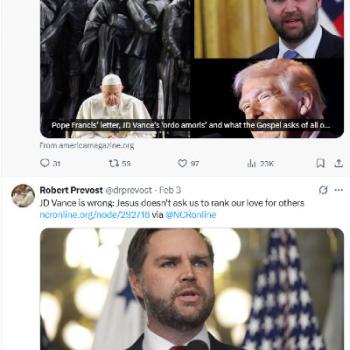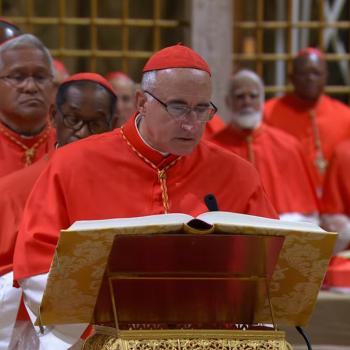When you choose anything, you reject everything else. ~ G.K. Chesterton
Not long ago I led a group of students on a service trip to a Native American reservation in New Mexico. It was a week-long immersion experience of living in their homes, eating their food, spending time with them, and learning about their lifestyle. It was a rich experience, but initially difficult for some of the students.
One reason for the sense of dislocation that they experienced was that they did not have immediate access to the usual "culture portals" they were used to—computer, TV, or cell phone. They felt out of touch with their world, unable to access the usual insta-updates via Twitter and Facebook, or the usual news of the world.
And yet the result of this forced "technology fast" was quickly apparent. Among a group of Indian storytellers, the students practiced listening, and telling stories. They spent time together in the stunning natural beauty of the mountains. They took their time over meals. They talked, laughed, worked, prayed, exercised. And they learned much.
A significant fruit of that experience for me has been the recognition that we live in an economy of time and space. What I mean is, there is only so much we can do in the time we have, and only so much space (mental and physical) that we can take up at any given time. If I am doing something, I am at the same time not doing a hundred other things. If my time is spent on a computer, it's not being spent cooking or playing with my daughters or reading a book or writing an opera. If my mind is on the macroeconomics of organized labor and the social cost of the federal deficit, it's probably not on how I might show my wife how much I love her. Fasting from technology for a week yielded unexpected goods, in the forms of relationships, creativity, and self-reflection. And these goods would likely have gone unnoticed if the students and I had the usual access to screens.
Understanding the economics of time and space lies at the heart of the season that Catholics embark upon this week. Lent is traditionally understood as a season of fast, and it is oriented toward the self-knowledge that comes from naming what we value, and what we fail to value enough.
I propose, then, for both Catholics and others, a technology fast for the sake of this kind of self-knowledge. The objective of the technology fast would be simple: to name our priorities in the use of our time and our space.
Technology can be very good, but it is a mixed good. It was supposed to carve out for us more leisure-time by freeing us from reliance on the land and the vagaries of nature. Yet it is abundantly clear that it has not yielded that good over the long term: we are working longer and harder, and sleeping less.
Technology was supposed to enable better relationships; email, social networking, tweeting, and so on were supposed to expand our ability to stay in touch with people. What I see, however, are two potential hazards in the technological mediation of relationships. First, when we relate to more people we spread ourselves thin. We have weak friendships with many people rather than strong, constantly nourished relationships with a few. Second, we begin to rely on technology for relationships. We need not actually talk to people when we can text or virtually poke them. Our relationships less frequently deploy the range and depth of meanings of facial expression and bodily symbolism, and as a result the language of our bodies has become impoverished. Physical presence in real time is a great gift, precisely because it involves use of the resources of space and time.
Technology was also supposed to give us a better understanding of the world. Compared to an age before the internet, for example, we can know instantly what is happening on the other side of the planet. Some speculate that technology was a key factor in the overthrow of the Mubarak regime in Egypt, for example. While these things may be true, they do not absolve us from the age-old challenge of practicing justice, discerning wisdom, and learning how to love each other as fellow citizens of a complex world. Information is not the same as good judgment. The knowledge of the world we possess is that of the average sophomore (Greek for "foolishly wise"): thinking we know everything, when in fact we have not yet achieved the wisdom of knowing, like Socrates, how much we really don't know.
A technology fast, even for a day or a weekend, would force us to ask how we use our time and space. It would force us to ask how we value people, how we care for each other and ourselves, how we contribute to making our lives mean something. There would also be the happy by-product of using less energy and thereby benefitting the environment.
This Lent, consider periods of technology fasting. Use that "found" time for spiritual reading, for prayer, for reaching out to friends. Fasting is ultimately in service to freedom, by releasing us from the craving for things that do not satisfy us. Let us find the roots of our desire and, in so doing, find greater freedom.
3/8/2011 5:00:00 AM





